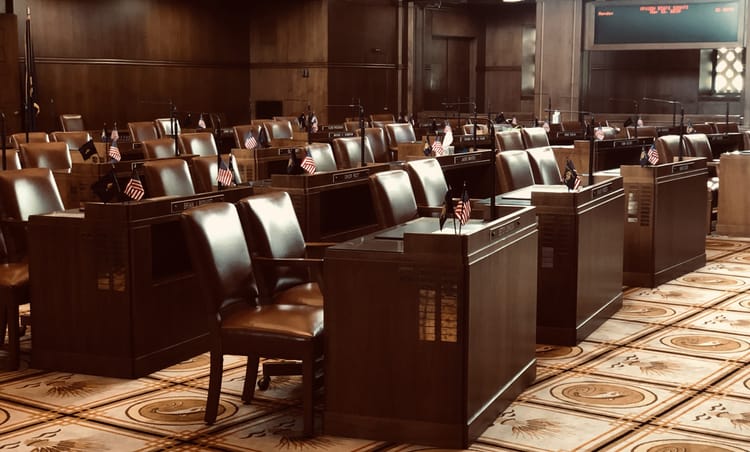Funding Fights & Leadership Shifts

The Takeaway
Oregon lawmakers returned to the Capitol for their first round of interim legislative meetings since they adjourned the regular session in June. In addition to the regularly scheduled hearings, the legislature also concluded its 35-day special session on funding basic maintenance operations for the Oregon Department of Transportation. A broader package failed during the final days of the regular session, leading Gov. Tina Kotek (D) to call for the special session over the Labor Day holiday weekend. Once the bill arrived in the Senate, however, leaders acknowledged they would not have the votes necessary to pass the partisan package until this week due to a member’s health complications after surgery.
The package ultimately approved by lawmakers on Monday scaled back some of the funding mechanisms and made a proposal to double the statewide transit payroll tax only temporary. Although the headline cost of the tax increase was reduced from the proposal during the regular session, from $15.5 billion to $4.3 billion, the transportation package still amounts to a substantial tax increase on the movement of goods and people throughout the state at a time when many families are struggling.
Immediately following passage of the package, Sen. Bruce Starr (R-Dallas) announced he would spearhead an effort to refer the tax provisions to voters. If a referendum qualifies for the ballot and voters reject the taxes, Oregon’s transportation funding woes would only magnify. Once the legislation is signed into law by the governor, opponents would need to collect 78,000 signatures to suspend it until voters have the final say. If the effort is successful and voters reject the transportation taxes, the governor and legislative leaders would find themselves in a precarious, and familiar, position of lacking the funds necessary to maintain core roadway and highway services.
Oregon’s Response to the “One Big Beautiful Bill” (H.R. 1)
The legislature hardly took a breath before shifting gears from one controversial tax debate to another — Oregon’s conformity to President Trump’s “One Big Beautiful Bill” (H.R. 1). Like all other states with an income tax, Oregon uses the federal tax system as the underpinning for its own income taxes. If Congress creates new deductions or other policies governing the determination of income, these policies will automatically be applied to state taxes unless the legislature passes a law decoupling them from such treatment.
The state’s unions and their affiliated think tanks have spent the last few weeks lobbying the legislature to convene in another special session to address the state’s conformity to federal tax law immediately. While there is always the possibility of another special session, it seems unlikely at this point, given the bruising 35 days the legislature spent on transportation and lack of appetite for back-to-back unpopular tax votes.
Although the new federal law impacts a long list of state tax policies, four are primarily the focus of lawmakers and advocates. Among tax changes affecting individuals, the new partial deductions for tips and overtime income are anticipated to lower tax collections by $300 million in the current biennium. And, for businesses, changes to the timing of deductions for capital assets and research expenses are anticipated to reduce state revenues by $517 million during the same timeframe.
On Tuesday, the Senate Finance & Revenue Committee held a closely watched hearing on the conformity debate. The legislature’s revenue office provided a detailed briefing on the mechanics of the new tax law, followed by testimony from union, business, and accounting stakeholders. Proponents argued the state must prevent individuals and businesses from claiming the deductions to stave off funding losses during a time when federal funds for core benefits and services are set to decline. Opponents countered that disallowing the deductions would add substantial costs and complexity for taxpayers, especially those addressing complex business deductions, which merely shift the timing of revenues rather than raising or lowering taxes.
Toward the end of the hearing, Chair Mark Meek (D-Gladstone) stated he was not interested in decoupling from the no-tax-on-tips and no-tax-on-overtime provisions, signaling the direction debates may turn in the coming weeks in the lead-up to the short session.
Changing of the Guard in the GOP Caucuses
On September 15, Senate Republican Leader Daniel Bonham (D-The Dalles) announced his resignation from both his leadership post and the chamber, effective October 5. The caucus elected Sen. Bruce Starr (R-Dundee) as his replacement. House Republican Leader Christine Drazan (R-Canby), who was elected to office and her leadership post last fall, quickly announced she would seek the appointment for the Senate seat. On Wednesday, House Republicans announced they elected Rep. Lucetta Elmer (R-McMinnville) as their new leader and Rep. Alex Skarlatos (R-Canyonville) as deputy leader, with Skarlatos tasked with spearheading the caucus’s campaign efforts in the coming year.
Notably, Oregon has not had a Republican leader in either chamber serve through both a long session and subsequent election cycle since 2018. While leadership turnover is common in politics, it is unusual to have such a long period where leaders are campaigning for the caucuses without the continuity or clear credit of the political promises and battles of the long session that stakeholders tend to value.





